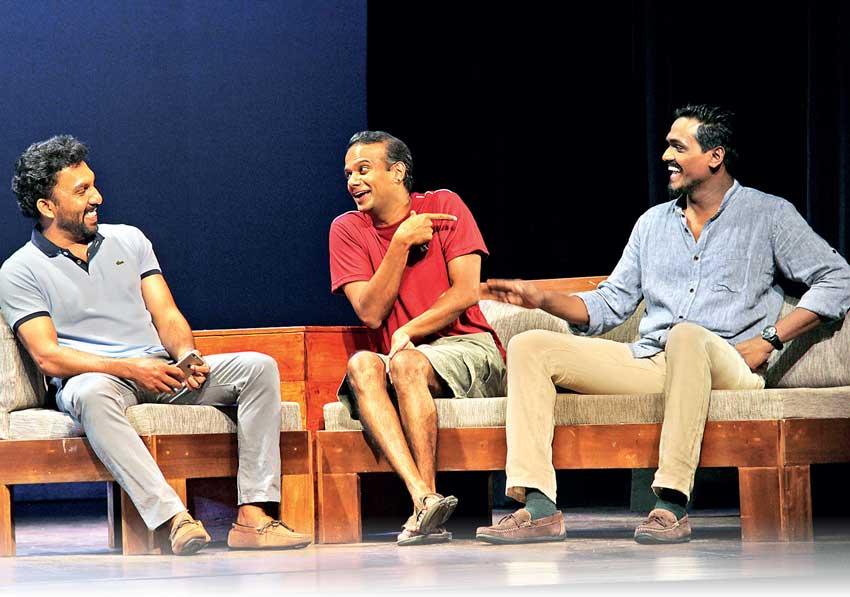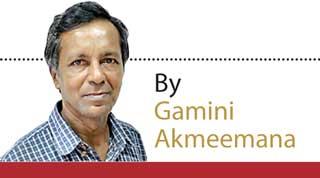Reply To:
Name - Reply Comment

A still from Rajitha Dissanayake’s new play Juli Mase Dawasak (A Day in July)
 Rajitha Dissanayake’s new play Juli Mase Dawasak (A Day in July) starts with a familiar setting; the drawing room of a middle class house with a couple in it. They start with commonplaces, but you sense something is about to explode. But the dramatist takes us in a new direction this time. What starts as his trademark exploration of man-woman turmoil extends to a probing examination of our society and the strong racist, xenophobic elements which form the bulwark of contemporary Lankan politics – or did so until April 09 when Sri Lanka’s social revolution began.
Rajitha Dissanayake’s new play Juli Mase Dawasak (A Day in July) starts with a familiar setting; the drawing room of a middle class house with a couple in it. They start with commonplaces, but you sense something is about to explode. But the dramatist takes us in a new direction this time. What starts as his trademark exploration of man-woman turmoil extends to a probing examination of our society and the strong racist, xenophobic elements which form the bulwark of contemporary Lankan politics – or did so until April 09 when Sri Lanka’s social revolution began.
That startling new context, which gives us the benefit of hindsight, makes Rajitha’s play even more relevant.
Dhanushka (Nalin Lusena) and Dhanushi are familiar enough to Rajitha fans – decent people having an extramarital affair. They are making use of a friend’s empty apartment to resolve their problem. But this is interrupted at a crucial moment by an unforeseen external factor – the army has sealed off all the flats after a suspicious-looking woman (with her head covered) was seen entering one of the apartments.
Written against the backdrop of the Easter terrorist bombings, the play can be seen as a comedy; but it is also a serious study of the Islamophobia which followed the attacks. The woman with the headscarf is presumed to be a Muslim, and hence a suicide bomber
|
Rajitha Dissanayake The dramatist exposes the fact that many chauvinists are ill-informed about the very culture they brag about.
|
Written against the backdrop of the Easter terrorist bombings, the play can be seen as a comedy; but it is also a serious study of the Islamophobia which followed the attacks. The woman with the headscarf is presumed to be a Muslim, and hence a suicide bomber.
Dhanushka rushes back to his apartment, leaving Dhanushi alone – with dire consequences. But that becomes secondary to the drama which unfolds in Dhanushka’s apartment, where he and wife Nilu (Jayani Senanayake) receive unexpected visitors – old friend Manoj (Gihan de Chickera) and Mathangaweera, his wealthy businessman friend from Australia.
Mathangaweera is a chauvinist to the core, representing the sophisticated, ultra nationalist Sinhala business class eager to dominate society socially, politically and economically at the expense of minorities (the latter dominant in business at least till the 1980s, and still formidable despite constant efforts to drive them out).
As the search for the non-existent suicide bomber continues, these four are confined to their apartment, which becomes a thorny debating ground for cultural supremacy as Weera and Dhanushka continue to probe each other.
The dramatist exposes the fact that many chauvinists are ill-informed about the very culture they brag about. Starting with the legend of Sinhabahu (with all the associated rhetoric about descending from a lion), Weera’s ignorance is on display when he goes on about the ‘Gajaba Wannama, ’ a superb ‘elephant dance.’
But these are negligible points as the chauvinistic juggernaut rolls forward. Weera isn’t content with just making money. Like Donald Trump, he wants to reshape the world according to his own flawed vision. Lacking political power, he finds a simpler solution – simply buy your way into people’s hearts with seemingly inexhaustible generosity.
At the core of this story is the background drama of drinking water to the flats by a Muslim supplier. The sudden new ‘Islamic bomb threat’ puts everything in a sinister new light. As Weera points out, the Muslim businessman could well be part of an Islamic terrorist group.
The battle here is one of moral supremacy, between Dhanushka’s sense of decency and Weera’s unmitigated cynicism. The arrival or an army search party (Anuradha Mallawaarachchi as the officer in charge) to the apartment brings matters to a head. The following questions and answers not only show just how hard it is to arrive at the truth of anything, especially of events as they are happening. They also act to define character, bringing out Manoj’s readiness to betray his friends to save his own skin.
Sri Lanka’s out-of-the-blue socio-political revolution gathering strength with each passing day has temporarily silenced chauvinists like Weera. But they are simply biding their time as the old guard of a vanishing order in the parliament desperately seeks to hang on it with devious political games. Whatever the outcome of this monumental struggle, Rajitha’s play has captured a vital moment in our recent history – when the chauvinists held the upper hand, free to indulge in witch hunts with the minorities as victims and scapegoats.
The performances are excellent, especially Sampath Jayaweera as the urbane, politically nauseating Mathangaweera, and Gihan de Chickera as the hypocritical, vacillating family friend.
Rajitha’s Dissanayake’s newest play ‘A Day in July 2019’ (2019 July Mase Dawasak) will be staged tomorrow at the Lionel Wendt. The play will commence at 7 pm. The tickets are available at the Lionel Wendt and priced at Rs 2500, 2000, 1500, 1000 and 700 (balcony).
More information on the play can be obtained by contacting
076-3263767 or
071-6297465.